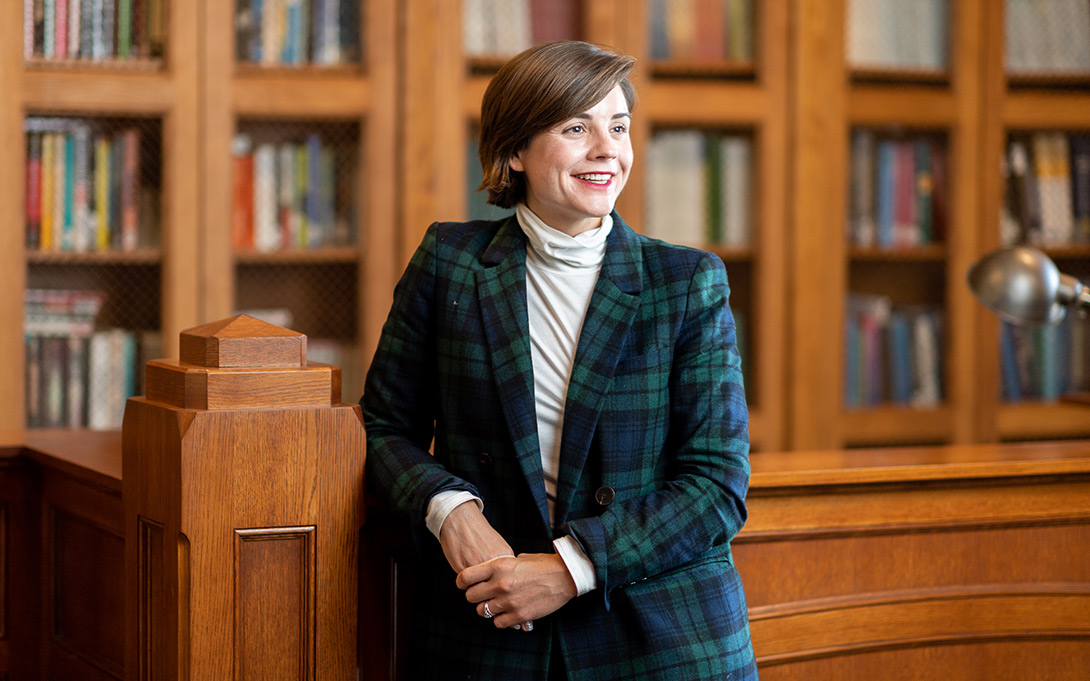
New Ford School associate professor Megan Stewart is an expert in international political conflict and revolutionary movements internationally and in the United States. Most recently, Stewart was an assistant professor in the School of International Service at American University.
Stewart’s research interests focus on explaining variation in how changes to social, economic, and political hierarchies are attempted and achieved, and how war or political violence is often the context or consequence of such endeavors. Her 2021 book, Governing for Revolution: Social Transformation in Civil War (Cambridge University Press) was shortlisted for Conflict Research Society Book of the Year (2022). In it, she asks "Why do some rebel groups undertake costly, intensive governance projects that trigger resistance and violence, undermine their legitimacy, strengthen rival rebel groups, and even put their own combatants and civilians at risk, while other rebel groups do not?"
This fall, Stewart will teach an undergraduate section of PubPol 474.002, "Values & Ethics: Violence and Social Inequality." She will also lead a graduate-level section of PubPol 510, "Politics of Public Policy," that examines central foreign policy debates related to international security, grand strategy, alliances and cooperation, hierarchy and anarchy, interstate war, civil war, economics and trade, migration, technology, and climate from the perspective of the U.S., other countries, and international institutions.
Q: What would you like readers to take away from your book, Governing for Revolution?
MS: I want readers to take away two key ideas. The first idea, in short, is that the behaviors of rebel groups in one civil war often shape the behaviors and actions of rebel groups in another. In particular, the Chinese Communist Party (CCP) as a rebel group was one of the most significant contributors to how subsequent rebel groups operated and behaved: other rebel leaders explicitly decided to imitate the CCP. The CCP's experiences even influence the strategies and behaviors of some rebel groups today.
The second key takeaway relates to how rebel leaders who imitated the CCP viewed the war. For these rebel groups, the purpose of the civil war was to not only defeat the governments they were fighting but to transform societies. Revolution did not follow the war, the war was the revolution. This social transformation, the revolution, was achieved through governance policies. Violence and battles were ultimately just a portion of the overarching conflict for some rebel groups. Intensely political, revolutionary governance programs–the focus of my study–were also essential components of the conflict.
Q: How are those lessons relevant in today’s world, in the United States and abroad?
MS: These lessons are important for today's world. For example, Al-Qaeda strategists explicitly reference the CCP's experience in revolutionary warfare. We cannot understand the nature of some conflicts today without understanding why rebel groups behave the way they do.
Additionally, my research suggests that governance is essential to social transformation. But, transformative governance is also highly complex and challenging.
Q: What research questions are you considering now?
MS: Currently, I am thinking about when political actors attempt radical social transformation and why some attempts are more successful than others. For example, the French Revolutionaries sought to decimalize both space and time, creating the metric system on the one hand and the Republican Calendar on the other. The metric system stripped away power from nobles, and the Republican Calendar stripped away power from the Church. Despite these challenges to pre-existing authorities, the metric system is almost universally used today, while the Republican Calendar is long since defunct. I want to explain this variation.
These questions are not esoteric. Some practitioners suggest that effective climate mitigation policies could involve a significant redistribution of resources in ways that could reshape societies. Understanding when such policies are most likely to be effective could be crucial for combatting the climate crisis.
Q: What topics do you enjoy teaching? Why?
MS: I enjoy teaching courses on civil wars because I can integrate historical documents, texts, and primary materials from rebel leaders into class. For something that students might only read about in the news, the documents and materials offer a human element to the conflict.
I also enjoy teaching classes on research design. I like to think about creative ways to answer research questions, and I like to help others do so as well. When students complete their research projects, it is gratifying to see them achieve something they never thought they could.
Q: What are you reading/watching right now?
MS: I recently finished reading two books: Wanda Coleman's Wicked Enchantment and W.S. Merwin's Shadow of Sirius. On the television front, I'm cautiously optimistic about the new Lord of the Rings show.
More news from the Ford School